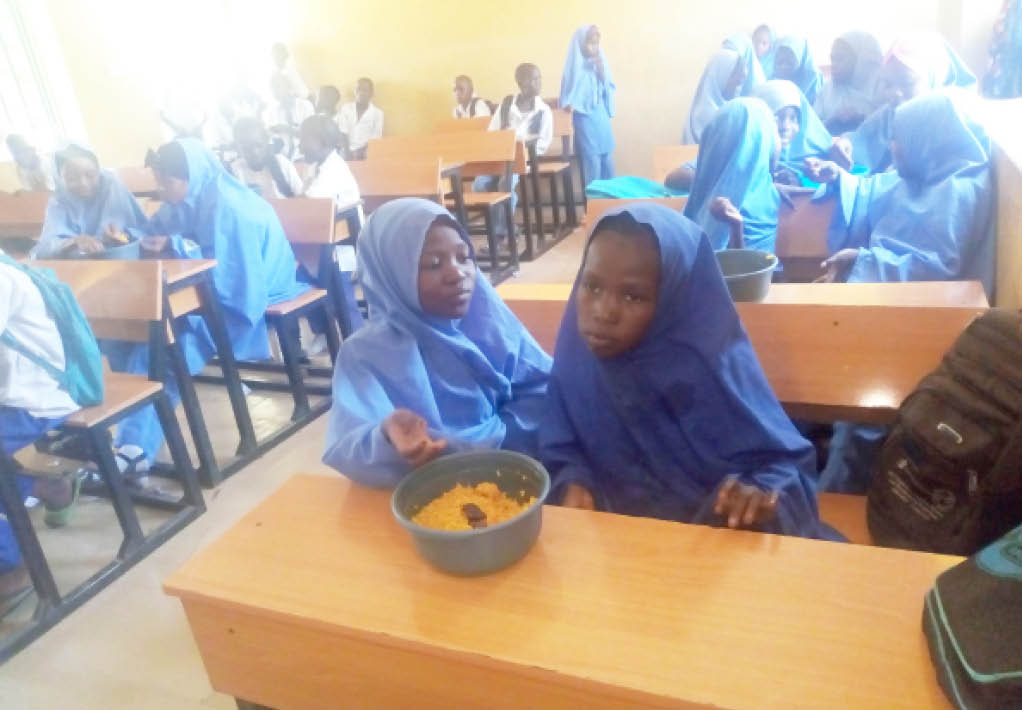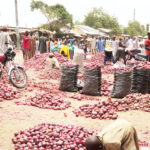The homegrown school feeding programme of the Federal Government, which started in 2016 in some states, is aimed at addressing poverty, improving the health and education of children and enhancing the social, mental and physical wellbeing of the kids, who are offered daily meals during school hours. With this initiative, the federal government funds the feeding of pupils from primaries one to three, while state governments take care of those in primaries four to six. Staggering amounts of money running into billions of naira have been invested in the programme since its commencement. Through the programme, the poorest children who suffer most from hunger are able to attend school regularly and promptly. But there are indications that the initiative, which took off on a sound footing, with impressive results, has succumbed to the current galloping inflation. Daily Trust Saturday takes a look at how the programme is currently faring in some states as schools resume.

Kano
Our correspondent gathered that the programme runs successfully in Kano but being hampered by corrupt practices among officials in some places. Findings show that more than 1.2 million pupils in 523 primary schools get daily meals. The federal government feeds 9.5 million primaries 1 to 3 pupils across the country daily. Our correspondent gathered that the state has the largest share of the programme, even as school children get nutritious meals and snacks throughout the five days of school hours. Over 10,000 cooks were recruited to supply food to schools under the programme.
- Boko Haram: Nightlife returns to Banki town 7 years after
- Why cannabis cannot be legalised in Nigeria now – Marwa
It was also gathered that the programme has not only enhanced students’ academic performance, as well as health, it has also increased school enrollment and boosted local food production and the state’s economy.
Many parents in the state expressed gratitude that government takes care of their children’s food and nutritional needs by providing them quality meals, including meat.
Malam Muhammadu Na’annabi told Daily Trust Saturday that their children were receiving nutritional food they could not get from their parents.
“Due to the current harsh economic condition, only few parents can afford to feed their children three square meals a day. Even if we can afford it, how many of us can provide nutritious food for our children? ” He asked rhetorically.
Daily Trust Saturday gathered that while the federal government is expending huge resources on the programme, huge amounts are still being siphoned through various corrupt practices by officials involved in the implementation of the programme.
Some of the cooks complained that they were not allowed to go to the market to buy foodstuffs because officials of the programme force them to buy from them.
“Although we receive the money directly through our bank accounts to procure rice, vegetables and meat or fish, members of the Community Reorientation Committee force us to purchase food items from them on higher costs, compared to markets prices,” a cook who spoke on the condition of anonymity said.
They, however, said the high cost of foodstuff did not affect the quality of the meals, but the quantity.
Another cook who also preferred anonymity said: “I cannot compromise the quality of my supply despite the high cost of foodstuff in the country. I reduce the quantity of the foodstuff. How can somebody who used to collect N82,000 for 100 pupils in those days be able to feed the same people with the same amount these days? ”
They called on the federal government to revisit the programme for the benefit of every stakeholder.
Enumeration increases number of beneficiaries in Borno
In Borno State, the 112,500 pupils being served a N70.00 daily meal each have reportedly increased to 640,000. This will eventually increase enrollment, both in rural and urban areas, as well as boost cognitive and academic performances of the children, according to experts.
The Minister of Humanitarian Affairs, Disaster Management and Social Development, Hajiya Sadiya Farouq, said during a meeting with the state officials penultimate week, that the programme, which provides meals to nine million pupils nationwide, would further receive additional five million pupils following a presidential directive. More beneficiaries will, therefore, be enrolled in Borno and other states.
A consultant in the state, Mohammed Alfa, said the programme started with 112,500 beneficiaries in 21 local government areas, but pupils from Bayo, Askira/Uba and Kukawa local government areas did not receive meals.

“When the state government realised that the number of pupils receiving the free meals did not tally with the total number of registered pupils, fresh enumeration was conducted, and in the end, 580,000 pupils were captured in the 21 local government areas. Again, when the enumeration was done in the remaining three local government areas, the totality of beneficiaries that would be enrolled in the programme reached 640,000. That number will continue to change as fresh enrollment is conducted next term,” he said.
Alfa said that with the enumeration exercise going on in almost all the nooks and crannies of the state, more pupils, especially those among the displaced people in various host communities would return to school.
The assistant headmaster of Community Primary School, Old G RA, Maiduguri, Mohammed Kyari, said that with the commencement of the programme two years ago, pupils no longer stayed away from school.
“More pupils attend classes since the programme started. But there are weeks pupils miss school when the vendors cease to supply meals if they do not receive their payments. Most of the kids do not eat breakfast before coming to school, and once food is not served in school, they pay less attention during lessons and make more trips to the clinic with hunger-induced headaches,” he said.
Kyari said a total of 1,692 pupils were receiving meals daily in the school, including 590 in primary one, 562 in primary two and 540 in primary three classrooms. “The pupils will increase in number as the programme continues and teachers strive to monitor the meals to ensure that quality is not compromised,” he added.
Another teacher, Azumi Usman, said vendors usually supplied the meals before break at 9:30am and leave the responsibility of distribution to class teachers.
She said fruits were given to the pupils at the beginning of the programme but the supply stopped afterwards.
“This also applies to moi-moi (alele), which was served once in a week as a good source of protein. It was stopped perhaps due to the increase in the price of beans or the use of poisonous insecticides by merchants to store the commodity,” she said.
She added that the quality of the meals must be improved to meet the target of reducing nutritional deficiencies among pupils.
Another female teacher said the meals were not palatable because the essential ingredients required in cooking are in short supply or even not used.
It was observed that the meals are supplied in rubber buckets and served cold sometimes, while at least two pupils eat from shared rubber plates with bare fingers.
One of the pupils (name withheld) said the meals were satisfactory and there was no incident of food-borne illnesses since the commencement of the programme.
Another pupil said although some of the meals, including jollof rice, were not presentable because they lacked basic ingredients, they were neither poisonous nor inedible.
One of the vendors, Kaka Mohammed, said intermittent supply of cooked foods to pupils was as a result of delay in payment by the authorities.
“We hardly receive payment for more than 10 days; and it takes a long time before we receive another bank alert. We do not supply meals if we are not paid. For instance, we received money on Friday last week after a two-week payment delay,” she said.
She added that vendors received N177, 000 at inception to feed 150 pupils for two weeks, but the money was later reduced to N82, 000 for 70 pupils in two weeks.
She also said each vendor bought foodstuff and eggs with the money received as payment, while meat and fish are supplied to them weekly under a separate arrangement.
Our correspondent learnt that the menu is made in such a way that pupils are served rice and beans with beef on Mondays, while spaghetti with fried fish is served on Tuesdays. On Wednesdays, they are given jollof rice with beef. On Thursdays they get moi-moi and boiled eggs, while they are served jollof rice with beef on Fridays.
Another vendor said that following the increase in prices of food, the money given to them was no longer enough to buy the quantity of foodstuff and ingredients required. She added that the authorities concerned had not addressed the complaint.
A parent, Ibrahim Alkali, said kids in most poor households were always eager to go to school without being scolded because of the free meals.
The focal person of the National Social Investment Programme (NSIP), Hajiya Aisha Waziri, said meals were monitored by the respective education secretaries in each local government area, who in turn work with teachers to ensure that quality is not compromised.
She said teachers kept track of the quality, quantity and palatability of the meals and other necessities through forms that are filled on a daily basis and submitted for assessment.
She also said the delay in paying vendors was usually caused by procedures that must be followed by agencies in the Treasury Single Account. She added that each vendor received payment for the number of days that pupils were fed.
She further said the complaint by vendors over the increase in prices of commodities was being looked into.
Programme yet to resume in Lagos
In Lagos State, the programme has not taken off because a directive from government is being awaited. However, our correspondent gathered that the N70.00 budgeted for each child per meal is no longer enough due to the continued rise in prices of food items.
The food vendors, we also gathered, can no longer carry on with supply because the money they are being paid is not enough to serve the purpose.
The executive chairman of the Lagos State Universal Basic Education Board (LASUBEB), Wahab Alawiye-King, disclosed that the programme had not commenced since schools resumed for a new session due to the above circumstances. He added that the state was currently undergoing Eligibility Verification Review (EVR) of the programme as part of monitoring and evaluation exercise to ensure that the available data are up to date.
Alawiye-King also disclosed that officials from Abuja were in Lagos a few days ago for the EVR and to discuss modalities to continue the programme, considering the rising cost of food items. He said inflation had affected every facet of the economy, including the school feeding programme.
He also said the snacks-for-thought feeding programme, an initiative of the state government, was designed to complement the federal government’s homegrown school feeding programme. He also noted that the programme was targeted at the early years classes, as well as the upper primary classes (primary 4-6), with a view to ensuring that no child is left out in the state.
Over 150,000 pupils benefit in Abia
About 197,140 primary school pupils from Abia are benefiting from the programme.
Mrs Florence Chukwude, the Abia Team Lead on the federal government verification task force said that 1,030 public schools in the state were currently on the programme.
She added that the number could increase very soon.
Chukwude said the ministry would soon capture schools that were not yet on the scheme in order to upgrade the number of benefitting schools in the state.
According to her, the programme had not only improved school enrolment but had also created employment opportunities for the food vendors.
“It has also improved local food production, thereby enhancing the social welfare of our farmers,” she added.
The Programme Manager, Abia School Feeding, Elder Gabriel Ahuruonye, said that the “Federal Government injects N450 million every month” into the programme.
The money, according to him, is paid directly to the account of food vendors.
Ahuruonye added that while the federal government feeds pupils from primary one to primary three, the state government complements the efforts by feeding pupils from Nursery one to three, as well as primary four to six.
However, parents and pupils differ on the quality and quantity of food served by the government to the various schools in the state.
Mrs Ngozika Nwogu, a mother of two, said from findings from her children, the food was delicious but not satisfactory.
“My children said the food is sweet, but not up to the quantity I gave them at home. Some of their classmates also complained of stomach upset the day they were served beans. I think the vendors need to pay attention to ingredients used in preparing the food,” she said.
Eight-year-old Chidera (surname withheld), a pupil at Umuahia Central School, who disclosed that the food was not being served in his school, said his mother had warned him not to eat the food whenever it was served.
Nine-year-old Ifeoma Orji (name of school withheld), said the food was not enough to go round the pupils the last time it was brought to her school.
A parent, Mr Sunday Williams, complained that the pupils were being cheated as one egg was shared among four pupils.

Programme not steady in FCT
At the Federal Capital Territory, Abuja, the programme which was launched in November, 2019, in some primary schools in partnership with the Federal Ministry of Humanitarian Affairs, Disaster Management and Social Development FMHDSD is not consistent as it is dogged by disruptions due to diverse challenges.
Daily Trust Saturday gathered that the programme which is supposed to cover primary 1 to 3 pupils and the same category in secondary schools, does not cover many junior secondary schools.
A visit to some affected schools by our correspondent revealed that it did not resume after the COVID-19 lock down. Even when it resumed, it was not consistent until it became steady very much later.
On the condition of anonymity, an official at some primary schools visited in Kubwa, said the programme resumed towards the end of the third term, but did not resume two weeks after the first term, “despite that the school resumption date was delayed for about two weeks, due to undisclosed reasons.”
Our correspondent also gathered that it is not the actual number of the vendors in the record that are rendering service to the affected schools.
A programme official who preferred anonymity, said his school was supposed to have about eight vendors, but only six were available.
“I don’t know whether they are not being paid, nor their reason for not doing the job,” the source added.
However, the National Coordinator of the National Social Investment Programme, Dr Umar Bindir, in a statement, told Daily Trust Saturday that the Federal Government was working assiduously to address the challenges with a view to guiding against disruption of the programme..
Bindir disclosed that government had been engaging relevant partners and stakeholders to proffer solution to the cost of feeding that has been a bane of the programme.
He pointed out that the quality of food was not only due to inflation but also failures on the parts of the people mandated to provide the meals.
He said: “It’s important to also note that we are currently engaged in strengthening the programme through several means in order to address the causes of poor quality of feeding, because the reports on the quality of food are not only a result of inflation and accompanying high cost of feeding. It also has to do with people who have been engaged to manage or provide the meals not doing what they are supposed to do.”
Bindir, however, disclosed that government had commenced an enumeration exercise with a view to verifying the existing pupils benefitting to lay a better foundation for implementation and also set the proper and right stage for scaling up the programme.
According to him, government is also working on strong policies that would curb any mismanagement of the programme in the various states.
“These policies include improving the process that the states use to engage caterers, vendors and suppliers to become fair, more transparent and also raise the capacity of the caterers to actually provide meals in a hygienic manner and in the right quantity and quality that would nourish a child,” he said.
“Further strengthening activities we are engaged in include providing a framework for the participation of the local community in sustaining the programme as well as deploying extensive monitoring systems to ensure compliance to the implementation process of the programme,” he said.
“We have been ironing out all the challenges that lead to payment delays from our end and as schools resume, we anticipate continuous and uninterrupted release of funds to the state-appointed vendors and caterers.
“We therefore call on the benefitting state governments to complement the efforts of the FG to ensure that the children are being fed and that all actors in the chain are fulfilling their roles and responsibilities. This will also require discouraging unhelpful and unnecessary influence by those who do not have the best interest of the pupils at heart.
“The parents and communities have an important role to play to support in holding to account those who are implementing the programmes in every school,” he said.
Clement Adeyi, Maureen Onochie, Adam Umar (Abuja), Christiana T. Alabi (Lagos), Lubabatu I. Garba (Kano), Misbahu Bashir (Maiduguri) & Linus Effiong (Umuahia)

 Join Daily Trust WhatsApp Community For Quick Access To News and Happenings Around You.
Join Daily Trust WhatsApp Community For Quick Access To News and Happenings Around You.

